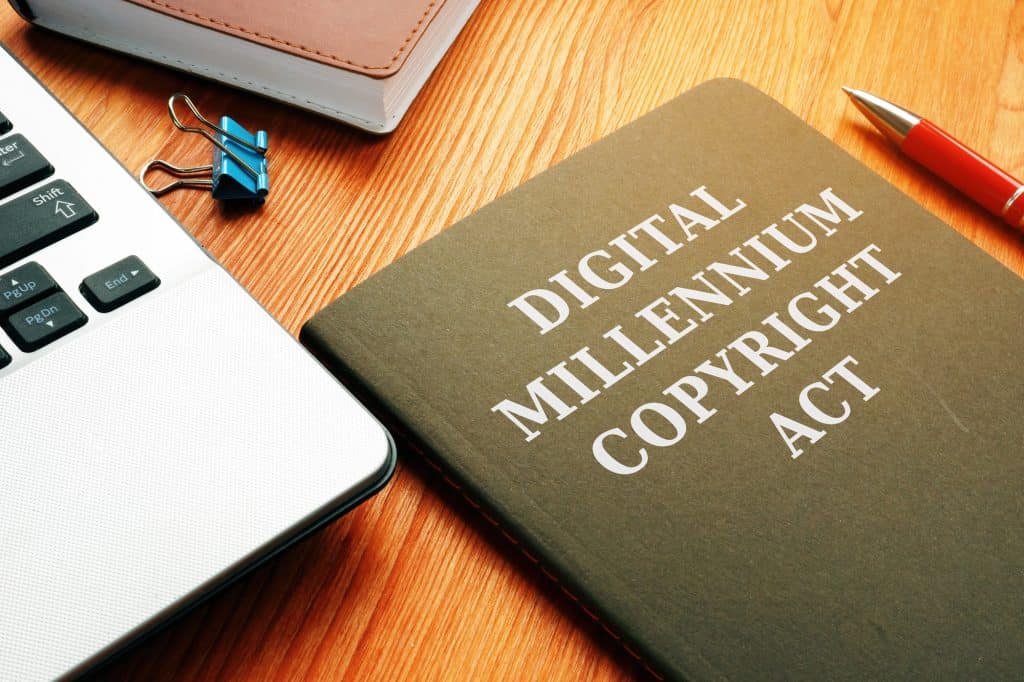The most common challenge many creators face these days is a copyright issue. Back in the previous non-Internet century artists didn’t face copyright issues as frequently as it wasn’t so easy to steal and spread around someone else’s work. But with the boom of the internet and digital world, there is a surge in copyright issues faced by artists, writers, authors, and photographers who publish their work online and then find it on non-authorized websites.
Table of Contents
What is DMCA?

Digital Millennium Copyright Act (or DMCA) is a rather controversial law by the US government enacted in 1998 by then-president Bill Clinton. The aim of DMCA is to balance the interests of copyright owners and users and look into any sort of copyright infringement that surface in the digital world.
DMCA is intended to regulate digital media and deal with copyright challenges the digital world faces. DMCA not only looks into the copyright infringement issues faced by users on the internet but also reinforces penalties for offenders.
DMCA in its original form was censured by several scientists who believed that this will largely disrupt the growing IT industry of the US. Following worldwide criticism, the law faced several revisions to incorporate various exceptions, but still, several countries prefer their own version of the law.
Does DMCA apply outside of the USA?
No, the DMCA is part of the United States copyright law, therefore is applicable only to websites hosted in the US. All sites hosted in the US are bound to obey the law. Therefore even if the copyright owner is outside of the US, they can still issue DMCA notice if the hosting website is located in the US.
However, there are many hosting providers and businesses who despite being hosted outside the US comply with their own copyright law and often accept DMCA takedown notices to avoid any legal aftermath in their own country.
In addition to that, most sites hosted in World Intellectual Property Organizations (WIPO) countries abide by the Digital Rights Management (DRM) law and entertain DMCA takedown notices. At this time there are around 200 countries that have signed the WIPO treaty.
What is a DMCA safe harbor?
DMCA safe harbor is referred to as the provision of the Digital Millennium Copyright Act which provides safe haven to Online Service Providers (OSP) and other internet intermediaries by exempting them from direct copyright infringement.
There are four safe harbors approved by Congress and in these cases, there is limited to no copyright infringement liability for Online Service Providers. Following are the permitted safe harbors under DMCA:
- System caching
- Information location tools
- Temporary digital network communication
- Storing information at the user’s direction on a system or network
The reason behind creating DMCA safe harbors is to expand the internet and to improve the quality and variety of services to be provided on the internet. It wasn’t possible to achieve it by limiting the liability of Internet Service Providers (ISPs).
ISPs would have found themselves committing copyright infringements while making copies of copyrighted content for the purpose of enhanced speed, hosting websites, or simply directing users to sites that possibly contain infringing content.
As such to avoid these problems and for better efficiency and expansion of the internet, there’s limited liability for ISPs and sites falling under one of the safe harbor categories.
What is fair use?

The right to use the copyrighted content without permission of the copyright owner in certain conditions is deemed as “Fair Use”. The legally permissible purposes for which the copyrighted content can be used and fall under the Fair Use category include:
- News reporting
- Commentary
- Research
- Criticism
- Scholarship
- Teaching
Fair Use promotes creativity and people using copyrighted content for the above-mentioned purposes won’t be charged with copyright infringement.
To determine whether there was Fair Use of the copyrighted work or not, consider the following factors:
- Nature of the copyrighted work/content
- Usage purpose of the copyrighted work; whether it’s of commercial nature or for an educational purpose
- The amount and substantiality of the portion used by the third person
- How the portion used will affect the potential market and its impact on the value of the copyrighted content
What is a DMCA takedown notice?
A DMCA takedown notice is an official notification to the company, search engine, ISP, or web host informing them that the material they are hosting or linking to infringes on a copyright.
The company or website at the receiving end of the notice should immediately take down the copyrighted material. If they don’t remove the material in question, then the ISP can forcibly take down the content.
The types of copyrighted material for which you can send a DMCA takedown notice (or DMCA request) include:
- A written text which includes books, articles, poetry, blogs, etc
- Pictures that you took and posted on your business’s official social media sites
- Artwork, photos, images, paintings, etc
- Songs, music, or other audio files
- Videos
- Digital software
The hurdle you may face while issuing a DMCA takedown notice is when the website that hosts the copyrighted content is not located either in the US or another country that follows the DMCA or copyright laws.
Does the work have to be registered before sending DMCA takedown notice?
No, you don’t have to register your work before sending a DMCA takedown request. Content in tangible form becomes your intellectual property as soon as it’s created and you hold the copyright to it and thus can send a DMCA notice.
Most people post photos, videos, or written content on the internet without any registration with the copyright office, but they hold the exclusive rights of the material and can send DMCA notice for any unlawful use of their content.
But if the person who sent a takedown notice receives a counter-notification stating that there was no copyright infringement, then they have to file a lawsuit within 14 days.
Registration is required if you would like to be able to file a copyright infringement lawsuit and claim monetary damages. Otherwise, DMCA takedown requests can be sent for any unregistered material for the sake of its protection.
How to write a DMCA takedown notice?

There is no official template to write a DMCA notice, but there are certain guidelines you should follow before writing a DMCA takedown notice. Take a look at these:
- Provide the URL of the website hosting copyrighted content, mention the infringing material, and cite any other detail you have.
- Cite the URL of the original content, its title, and other details.
- Clearly state that you have a good faith belief that your content is infringed upon that you don’t permit usage of your copyrighted content and that the information in the notice is correct.
- Make a statement under penalty of perjury that all the information you have provided is accurate.
- Include your contact information because it’s a legal notice.
- Finish it off with your physical or electronic signature.
It is very important to provide the necessary details, statements, and disclosures and format them accordingly to ensure the success of your takedown notice. If you find it complicated or are unsure of the process, you may use our professional takedown service and we’ll handle it for you.
Where to send a DMCA takedown notice?
DMCA takedown notice can be sent to various sources involved in publishing the infringed material.
Start with the easiest way which is emailing the site’s owner to take down your copyrighted content. Usually, people respond to it to avoid any legal consequences and remove your copyrighted content from their site. You may usually find contact information or a contact form on their site. To improve your chances of success before reaching out, you can verify the email to confirm it’s actually a valid address.
If the owner refused to do so, you may send a signed DMCA request to their hosting provider. They’ll act upon DMCA notice according to their laws.
If the hosting provider finds your request to be legitimate, it has the authority to either immediately take down the infringing content or disable access to it.
Besides filing a request with the website’s hosting provider, you can also file a DMCA takedown request with Google. After entering the contact information, you have to provide the URL of both your original content and the infringed material. If successful, you will at least disable the infringing web page from getting additional exposure via Google’s search engine. It will also negatively impact their SEO potential and the site’s owner will think twice before stealing someone’s content next time.
Why do I need to include personal information?
The most common question asked by the users is why there is a need for personal information, especially address and phone number when sending the DMCA takedown notice. The answer is rather simple – it’s a legal document.
Obviously, people may have legitimate privacy concerns regarding their personal details being exposed to the infringer, and getting their hands on your address and phone number is not such a pleasing prospect.
DMCA law is quite vague regarding this and mentions that the DMCA notice should bear the personal information through which the service provider can contact the notifier. So theoretically, it can be just an email ID. In real life though, unfortunately, many takedown notices fail if they lack those personal details with providers citing the lack of information or improper formatting of the DMCA notice.
If you’re concerned about providing your personal details to a stranger, you may preserve your privacy with a virtual business address or you may simply hire and authorize an agent to handle it for you.
What should I do if I receive a DMCA notice?

Yes, it sounds scary considering its legal standing. You can get a DMCA takedown notice if you host or manage websites or post any content online.
The first thing you should do is calm down, relax, and be honest with yourself. Think about whether you committed copyright infringement intentionally or unintentionally. If you find yourself guilty of doing this, then the best thing you can do is to rectify the mistake. Immediately locate the infringed content and take it down as soon as possible.
There is a high possibility that you didn’t steal the content intentionally and posted the copyrighted content on your website without a thorough understanding of copyright laws. Or maybe the person you took permission from to post the content didn’t actually own the content in the first place.
And if you host multiple sites with several people posting and sharing content, there is a great probability that it was them who committed copyright infringement and you receive the notice as the next logical person to contact. Nevertheless, it’s better to take the DMCA takedown notice seriously and remove the offending content instantly.
Other possibilities could be that you consciously used the copyrighted content within the boundaries of Fair Use. If that’s so, then contact the notifier and share the details of the work you used their copyrighted content for. It’s quite possible that you will sort this issue out and come to an agreement with the owner of the copyrighted content.
What is a DMCA counter-notice?
If you remain firm in your belief that you didn’t commit copyright infringement and failed to peacefully settle the issue with the person who sent the notice, you can send a counter-notice to the notifier.
The counter-notice, besides holding your contact details, should include the content which was removed following DMCA takedown notice. Furthermore, you should state under the penalty of perjury that you didn’t commit copyright infringement and that the content was removed mistakenly.
By filing a counter-notice you are agreeing to “accept service of process” from the notifier. This means you understand that this counter-notice may result in a lawsuit.
The complainant on the other hand when receiving a counter-notice will either stop pursuing the takedown request or will possibly file a lawsuit within 14 days. So be extra cautious and confident when filing a counter-notice as it may result in a lawsuit.


